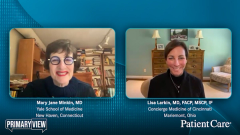
Nonestrogen Treatments for Menopause
Panelists discuss alternative therapies for women who are not candidates for or choose not to use hormonal therapy, review nonhormonal treatment options recommended by the North American Menopause Society, and explore the growing importance of Level I evidence and consensus opinions in creating a more holistic view of available therapies, both hormonal and nonhormonal.
Episodes in this series

Episode 8
The following transcript has been edited for clarity, style, and length.
Mary Jane Minkin, MD: For women who cannot or choose not to take estrogen therapy—whether due to anxiety, personal preference, or medical contraindications—there are alternatives available. Some of these options include medications traditionally used off-label for managing hot flashes. For instance, low-dose antidepressants, including SSRIs and SNRIs, gabapentin, and even certain bladder anticholinergics, have shown varying degrees of effectiveness.
However, these medications often come with side effects that can exacerbate existing menopausal symptoms. For example, SSRIs may cause weight gain and reduced libido, which are common complaints from menopausal women. Gabapentin can lead to bloating or fatigue, and anticholinergics may worsen dry mouth and constipation. These side effects often make such treatments less desirable.
This is where a newer category of medications, NK3 and NK1 receptor antagonists, stands out. They are specifically effective for hot flashes and, importantly, do not come with the common side effects of older medications. Another remarkable attribute of these drugs is how quickly they work—patients often notice improvement within one to two weeks. This rapid response can help sustain patient morale and compliance, offering a welcome alternative to traditional off-label treatments.
Lisa Larkin, MD: I’d like to add to that by encouraging everyone to consult the 2023 non-hormonal position statement from the Menopause Society. This document thoroughly reviews the now two FDA-approved non-hormonal treatments for hot flashes, including elinzanetant, and evaluates the off-label use of other medications. It also provides an overview of lifestyle modifications, mind-body approaches like cognitive behavioral therapy, and the plethora of over-the-counter supplements marketed for menopausal symptoms.
Post-Women’s Health Initiative (WHI), we saw a significant shift away from hormone therapy. Many women turned to supplements and non-hormonal options, including SSRIs, which primary care providers often recommend for hot flashes. However, the data supporting these supplements is limited, and the Menopause Society ultimately does not recommend them due to a lack of robust evidence.
That said, many patients still want to try supplements, especially if they’re pursuing a more natural approach. While I generally don’t oppose patients experimenting with supplements, I’m cautious when it comes to those with complex medical histories or who are on medications like tamoxifen, aromatase inhibitors, or multiple blood pressure drugs. In such cases, potential drug interactions are a significant concern.
Minkin: We haven’t even touched on compounded hormones yet, which is a contentious topic. After the WHI results in July 2002, many women stopped using FDA-approved hormone therapies and turned to compounding pharmacies for alternatives. While these compounded products often relieved hot flashes, they are unregulated, lack standardized dosing, and do not come with the necessary safety warnings. This makes them less safe, particularly for patients with other medical conditions.
The Menopause Society does not endorse compounded hormones for these reasons. As practitioners, we need to emphasize the importance of transparency and safety, which includes informing patients of potential side effects associated with any treatment.
Larkin: Another point worth addressing is the placebo effect in studies on vasomotor symptoms. In clinical trials, placebos often result in a 30% reduction in symptoms, with hormonal therapies achieving well over 90% effectiveness. Non-hormonal treatments generally fall somewhere between 40% and 70%, but they come with trade-offs, such as sexual dysfunction, cognitive effects, or weight gain, especially when used off-label.
Managing menopausal symptoms is complex and requires individualized care. Non-hormonal options are invaluable for women who cannot or choose not to take hormones, but they are not a substitute for the gold standard of menopausal hormone therapy.
Minkin: Absolutely. When we evaluate treatments, we rely on level one evidence from randomized, double-blind, controlled trials. While patient anecdotes can provide insight, we must critically assess the evidence to ensure we’re offering the best possible care. Even placebo effects can be significant, sometimes reaching as high as 50%. This underscores the importance of rigorous clinical data in guiding treatment decisions.
Newsletter
Enhance your clinical practice with the Patient Care newsletter, offering the latest evidence-based guidelines, diagnostic insights, and treatment strategies for primary care physicians.





























































































































